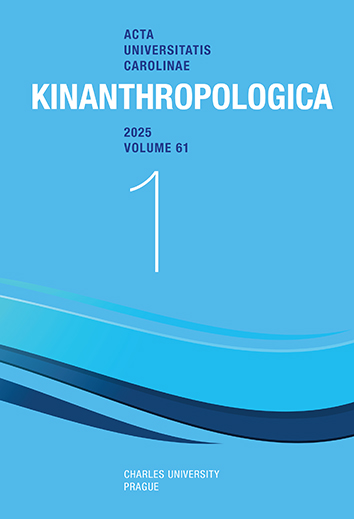Acta Universitatis Carolinae Kinanthropologica (AUC Kinanthropologica) is an international peer reviewed journal for the publication of research outcomes in the humanities, the social sciences and the natural sciences, as applied to kinathropology. It is a multidisciplinary journal accepting only original unpublished articles in English in the various sub-disciplines and related fields of kinanthropology, such as Anthropology, Anthropomotorics, Sports Pedagogy, Sociology of Sport, Philosophy of Sport, History of Sport, Physiology of Sport And Exercise, Physical Education, Applied Physical Education, Physiotherapy, Human Biomechanics, Psychology of Sport, Sports Training and Coaching, Sport Management, etc. The journal also welcomes interdisciplinary articles. The journal also includes reports of relevant activities and reviews of relevant publications.
The journal is abstracted and indexed by CNKI, DOAJ, EBSCO, ERIH PLUS, SPOLIT, SPORTDiscus, and Ulrichsweb.
AUC KINANTHROPOLOGICA, Vol 47 No 2 (2011), 38–50
Olympism in Poland in System of Communist Sport and His Rennaisance after 1989
Kristina Jakubcová
published online: 04. 02. 2015
abstract
Olympism in Poland in System of Communist Sport and His Rennaisance after 1989 Although the Olympic organization, namely the Polish Olympic Committee (PKOL) is the youngest one of Central European countries there has been promoted the Olympic idea by many enthusiasts since the time of the restoration of the modern Olympic Games. Despite the initial distrust of intellectuals and of the public after the First World War Olympism was being quickly developing. After the Second World War, it was used by the Communist power only as a weapon for a rivalry with the imperialist powers and with the Communist rivals. The Olympic Committee was entirely subordinated to the state organization and since fifties they had a common chairman as well. The subordinate position had its advantage - the income of the state money was not very limited. After the fall of the communist regime and the threat of splitting PKOL gained independence, but also had to start looking for other financial resources than the state treasury. Polský olympismus v systému komunistického sportu a jeho renesance po roce 1989 Přestože olympijská organizace, tedy Polský olympijský výbor (PKOL), je v Polsku ze středoevropských zemí nejmladší, olympijské myšlenky zde byly mnohými nadšenci propagovány od samého obnovení moderních olympijských her. Přes počáteční nedůvěru intelektuálů i veřejnosti se po první světové válce olympismus rychle rozvíjel. Po skončení druhé světové války však komunistické moci sloužil jen pro soupeření s imperialistickými mocnostmi i komunistickými rivaly. O filozofii či životní postoj v žádném případě nešlo. Olympijský výbor byl zcela podřízen státní organizaci, s níž měl od padesátých let společného předsedu. Výměnou za podřízené postavení nebyl přísun státních finančních prostředků příliš omezen. Po pádu komunistického režimu a překonané hrozbě svého rozštěpení nabyl PKOL samostatnosti, zároveň však musel začít hledat i jiné finanční zdroje než ze státní pokladny.
keywords: Poland, Olympic Committee, Communism Polsko; olympijský výbor; komunismus
157 x 230 mm
periodicity: 2 x per year
print price: 190 czk
ISSN: 1212-1428
E-ISSN: 2336-6052
